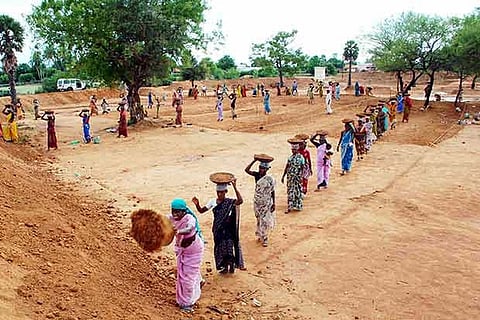

New Delhi
On one hand, Sitharaman announced a mega stimulus push for education, health and rural employment, on the other, she gave a road map for a massive privatisation and merger drive of public sector undertakings in certain areas.
Accordingly, on the fifth and the final day of detailing the mega Rs 20 lakh-crore economic package under the Centre's 'Self-Reliant India Movement', the minister also gave a monetary break-up of all the measures she had announced during the last 5 days.
Overall, these measures are cumulatively worth Rs 20,97,053 crore and also includes RBI instruments and steps announced under the Pradhan Mantri Garib Kalyan Package (PMGKP).
The day saw the minister announce an additional Rs 40,000 crore for the Mahatma Gandhi National Rural Employment Guarantee scheme (MGNREGS).
In the Union Budget 2020-21, the government had allocated Rs 61,500 crore for MGNREGS, and the additional Rs 40,000 crore will be over and above this budget estimate (BE), she said.
This additional amount is expected to generate nearly 300 person days of employment in total.
Significantly, the decision will aid scores of migrant workers who have left for their villages find employment.
But the biggest announcement was on the new Public Sector Enterprise Policy, and opening up of all sectors to private players.
Sitharaman said that under the new policy, a list of strategic sectors requiring presence of PSEs in public interest will be notified and in these sectors, at least one enterprise will remain in the public sector and private sector will also be allowed to operate.
Notably, Sitharaman announced that in the non-strategic sectors, all public sector units will be privatised. The timing of the privatisation will depend on feasibility and other factors, she added.
Furthermore, the minister gave a major relief for businesses by easing insolvency norms.
In relation to 'Ease of Doing' business direct listing of securities by Indian public companies in permissible foreign jurisdictions has been allowed.
Similarly, private companies which list NCDs on stock exchanges are not to be regarded as listed companies.
The minister announced that no fresh insolvency case will be admitted for the next one year. The Centre had earlier suspended any fresh admission for six months.
A special insolvency framework for MSMEs will also be set up. The threshold for insolvency will also be raised to Rs 1 crore from the current Rs 1 lakh which will be supportive for the MSME sector.
In another set of reform measures announced on Sunday minor technical and procedural defaults under the Companies Act were decriminalized, including shortcomings in CSR reporting, inadequacies in board report, filing defaults, and delay in holding of annual general meetings.
Besides, seven compoundable offences will be dropped, while five offences will be dealt with under an alternative framework.
The FM further allocated monetary support for social sector schemes such as healthcare and education.
Regarding healthcare, she announced that block infectious diseases hospitals will be set up in every district. Lab network and surveillance will also be strengthened.
Sitharaman also raised the borrowing limits of states from 3 to 5 per cent of the GDP, for financial year 2020-21, acceding to the demand of the states.
The handholding measure of the Centre will give states extra resources of Rs 4.28 lakh crore this year.
This would come in handy at a time when the states' tax resources have fallen sharply during the lockdown while the expenditure needs have risen to combat the virus crisis.
In terms of the monetary break-up, she listed measures worth Rs 20,97,053 crore, including RBI measures and steps announced under PMGKP.
Under the break-up, on the first day announcements with allocations worth Rs 5,94,550 crore were made, while on the second day steps on agriculture, housing, rural sectors worth Rs 3,10,000 crore were made.
Another Rs 1,50,000 crore were allocated for several schemes to revive agriculture and allied sectors amongst others on the third day.
On the fourth and the fifth day, the FM gave a mega push to boost mining, defence, civil aviation and power distribution sectors via structural reforms and stimulus worth Rs 48,100 crore.
Consequently, these steps come to a total of Rs 11,02,650 crore.
The package also include earlier announcements under PMGKP worth Rs 1,92,800 crore and RBI measures including Rs 8,01,603 crore which come to Rs 9,94,403 crore.
These announcements were made under the Prime Minister's mega stimulus package amounting to 10 per cent of the gross domestic product (GDP).
Visit news.dtnext.in to explore our interactive epaper!
Download the DT Next app for more exciting features!
Click here for iOS
Click here for Android